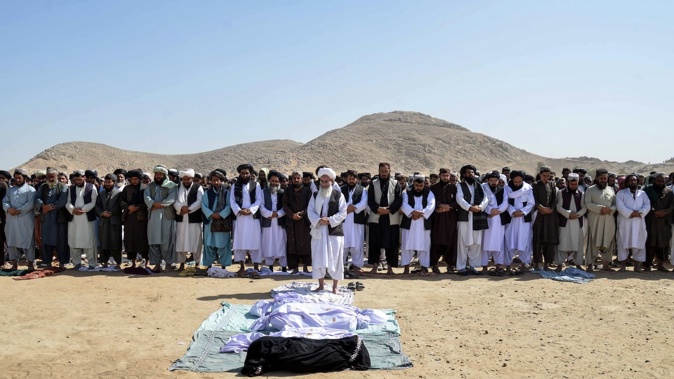
A ceasefire along the frontier between Afghanistan and Pakistan was holding yesterday, officials on both sides said, after dozens of troops and civilians were killed in cross-border clashes.
In Spin Boldak, a flashpoint on the Afghan side, an AFP journalist saw shops reopening and residents returning to homes they had fled during the fighting.
The 48-hour truce, which expires tonight, was aimed at allowing time to “find a positive solution ... through constructive dialogue”, Pakistan said.
Whether the temporary truce would be extended now depended on Afghanistan’s response, Pakistani Prime Minister Shehbaz Sharif said.
“If, in 48 hours, they want to resolve the issues and address our genuine demands, then we are ready for them,” Sharif told his cabinet, reiterating that Pakistani Taliban militants should be eliminated and that Afghan territory should not be used to plot attacks.
Pakistan is facing a resurgence of attacks against its security forces on its western border with Afghanistan, led by the Pakistani Taliban and its affiliates.
Spin Boldak’s health director said 40 civilians were killed and 170 wounded on Wednesday, while the UN mission in Afghanistan (UNAMA) has reported at least 37 killed and 425 wounded in several provinces impacted by the clashes.
“Our houses were bombed, a child was wounded. I heard the plane myself,” Abdul Zahir, a 46-year-old resident, told AFP. “It’s terrifying.”
Hundreds of residents and Taliban officials attended the funeral of seven members of the same family in Spin Boldak, an AFP journalist saw.
Pakistan accuses Afghanistan of sheltering militants who plan frequent assaults from Afghan soil – a charge the Taliban Government denies.
Pakistani border officials told AFP yesterday that “no violence was reported overnight, and the ceasefire remains in effect”.
A senior security official in Peshawar said: “Additional paramilitary troops have been deployed to counter potential ... militant activity that could jeopardise the ceasefire.”
Blasts were reported in the Afghan capital, Kabul, shortly before the truce was announced, as well as in the southern province of Kandahar, where the Afghan Taliban’s shadowy supreme leader lives.
UN High Commissioner for Human Rights Volker Turk welcomed the truce and urged both sides to prevent further harm to civilians and “commit to a lasting ceasefire”.
‘Precision strikes’
The first explosions that struck Afghanistan last week – blamed by the Taliban on Pakistan – occurred while Afghanistan’s top diplomat was on an unprecedented visit to India, Pakistan’s longtime rival.
Taliban authorities then launched an offensive at the border, prompting Pakistan to vow a strong response of its own.
Exchanges of fire from Saturday killed dozens of people, with renewed violence on Wednesday also causing civilian casualties, according to Afghanistan.
The Taliban Government officially blamed Wednesday’s blasts in Kabul on the explosion of an oil tanker and a generator.
However, Pakistani security sources said its military targeted an armed group with “precision strikes” in Kabul, as well as hitting Afghan Taliban bases in Kandahar.
There were blackouts overnight and into yesterday in some areas of Kabul, caused by electricity cables damaged in the explosions, AFP journalists in the city said.
The journalists saw municipal workers carrying out repairs in one neighbourhood, where the road was charred and apartment windows had been blown out.
At least five people were killed and 35 wounded in Wednesday’s explosions, an Italian agency that runs a hospital in the city said.
“We started receiving ambulances filled with wounded people,” said Dejan Panic, of Emergency.
Ten people were in critical condition, with injuries including shrapnel wounds, blunt trauma and burns.
- Agence France-Presse
Take your Radio, Podcasts and Music with you









